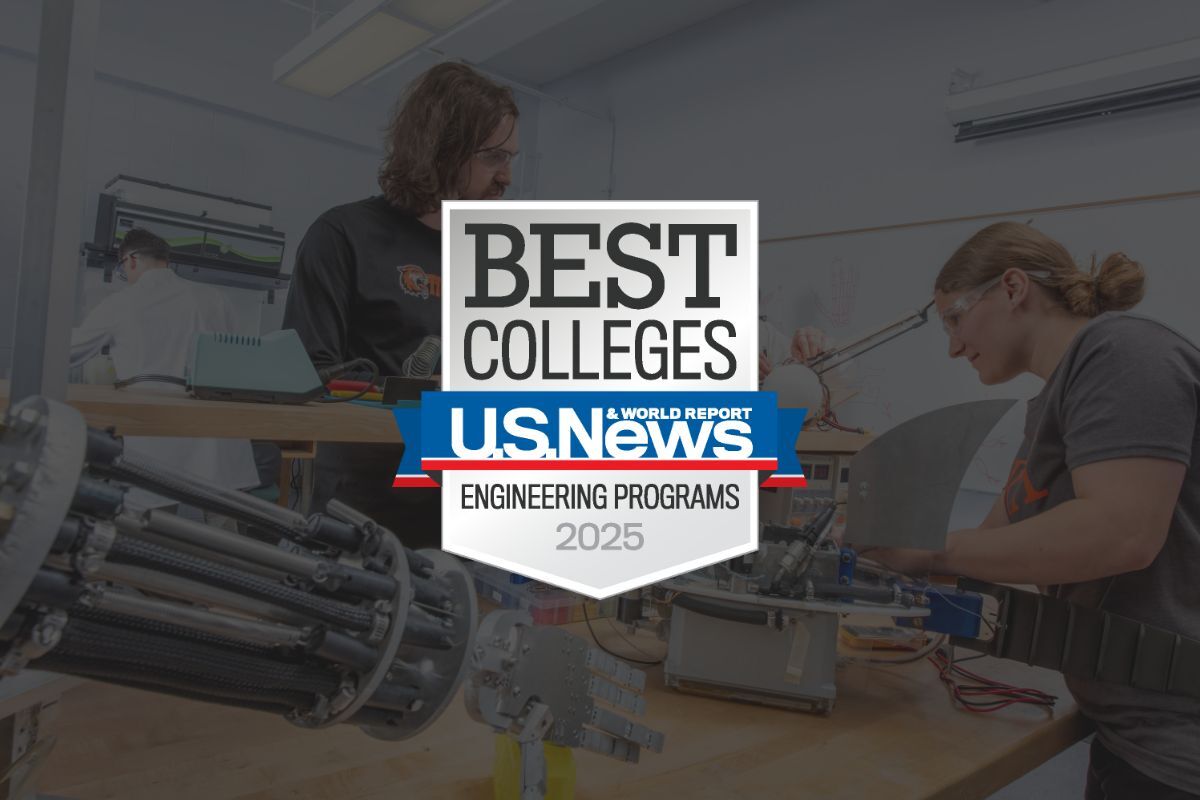Clean and Renewable Energy Option - Electrical Engineering BS

Clean and Renewable Energy Option
Electrical Engineering BS
- RIT /
- College of Engineering /
- Academics /
- Clean and Renewable Energy Option - Electrical Engineering BS
RIT’s clean and renewable energy option in electrical engineering will prepare you to develop and implement solutions that reduce, prevent, or mitigate serious environmental threats to our planet.
Overview for Clean and Renewable Energy Option - Electrical Engineering BS
Why Study RIT’s Clean and Renewable Energy Option in Electrical Engineering?
Advanced Electives: Gain a deeper understanding of clean and renewable energy systems through courses designed to broaden your understanding of critical environmental issues.
Captivating Senior Project: Put your knowledge to work on an exciting multidisciplinary project that focuses on developing, solving, or advancing an aspect of clean energy.
STEM-OPT Visa Eligible: The STEM Optional Practical Training (OPT) program allows full-time, on-campus international students on an F-1 student visa to stay and work in the U.S. for up to three years after graduation.
With the growing energy demand and an ever-heightened awareness of environmental protection worldwide, every industry plays a role in developing and implementing solutions that reduce, prevent, or mitigate severe threats to our planet. It has become critical for electrical energy to be developed from sources that do not pollute the atmosphere or rely on the depletion of natural resources. Renewable sources, such as solar, wind, and geothermal, are essential for a sustainable future. Improving the efficiency of existing electrical generation, transmission, and distribution systems is equally important. Demand for research and development in clean and renewable energy is growing quickly. Nearly every industry is focusing on developing and investing in clean and renewable energy options, creating exciting career opportunities where you can make a difference in the future of our environment.
This option is part of the electrical engineering BS program.
Advanced Electives
The clean and renewable energy option in electrical engineering includes advanced elective courses designed to provide a depth of understanding of clean and renewable energy systems. Core electives include:
- Clean and Renewable Energy Systems and Sources
- Energy Conversion
- Electric Power Transmission and Distribution
- Advances
Multidisciplinary Senior Design
Multidisciplinary Senior Design is a two-course sequence in the final year of study. It’s a capstone learning experience that integrates engineering theory, principles, and processes within a collaborative team environment. Multidisciplinary student teams follow an engineering design process, which includes assessing customer needs, developing engineering specifications, generating and evaluating concepts, choosing an approach, completing systems and subsystems designs, and implementing the design to the extent feasible, for example by building and testing a prototype or implementing a chosen set of improvements to a process. You’ll apply the knowledge you have learned in the classroom and from your co-op experiences to this design project. Students in the clean and renewable energy option are expected to work on a design project that focuses on developing, solving, or advancing an aspect of clean energy.
-
#51 Best Engineering Undergraduate Programs, 2025
RIT’s engineering majors are ranked among the Best Undergraduate Engineering Programs in the nation.
-
Accepted Student Open House
Visit campus on March 29 or April 5 to meet faculty, tour campus, and ask your questions.
Careers and Cooperative Education
Cooperative Education
What’s different about an RIT education? It’s the career experience you gain by completing cooperative education and internships with top companies in every single industry. You’ll earn more than a degree. You’ll gain real-world career experience that sets you apart.
Co-ops and internships take your knowledge and turn it into know-how. Your engineering co-ops will provide hands-on experience that enables you to apply your engineering knowledge in professional settings while you make valuable connections between classwork and real-world applications.
All engineering majors are required to complete four blocks (approximately 48 weeks) of cooperative education experience. For students in the clean and renewable energy option, co-ops are expected to take place in companies that develop or distribute clean energy solutions. A sampling of companies that hire RIT students for co-ops and for full-time employment in the areas of renewable and clean energy include GE Energy, Siemens, TESLA, ABB, NextEra Energy, National Grid, SunPower, First Solar, and Renewable Energy Group.
Featured Work and Profiles
-
RIT Alumnus Builds a Multimillion-Dollar Optical Sensing Startup
RIT graduate Michael Oshetski '03 turned a casual airport conversation into a thriving business, cofounding Micatu to revolutionize optical sensing technology and now shaping the future of sensing...
Read More about RIT Alumnus Builds a Multimillion-Dollar Optical Sensing Startup
Admissions and Financial Aid
This program is STEM designated when studying on campus and full time.
This option is part of the electrical engineering BS. Please visit the degree program page for admission requirements.
Financial Aid and Scholarships
100% of all incoming first-year and transfer students receive aid.
RIT’s personalized and comprehensive financial aid program includes scholarships, grants, loans, and campus employment programs. When all these are put to work, your actual cost may be much lower than the published estimated cost of attendance.
Learn more about financial aid and scholarships
Contact
- Ferat Sahin
- Department Head
- Department of Electrical and Microelectronic Engineering
- Kate Gleason College of Engineering
- 5854752175
- feseee@rit.edu
Department of Electrical and Microelectronic Engineering






